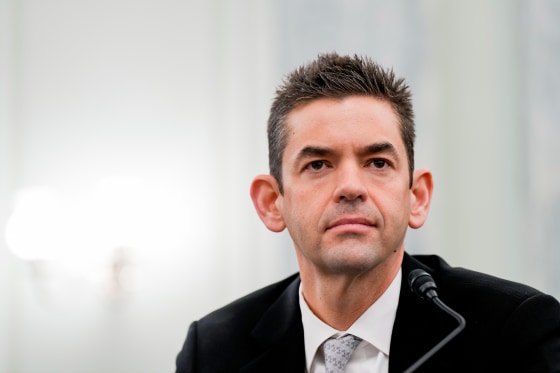President Donald Trump announced Tuesday that he is once again nominating billionaire entrepreneur Jared Isaacman to lead NASA, months after he abruptly pulled Isaacman’s name from consideration in May.
“Jared’s passion for Space, astronaut experience, and dedication to pushing the boundaries of exploration, unlocking the mysteries of the universe, and advancing the new Space economy, make him ideally suited to lead NASA into a bold new Era,” Trump said in a post on Truth Social.
If confirmed, Isaacman would take over the leadership of NASA from Transportation Secretary Sean Duffy, who has been serving as the space agency’s interim administrator since July.
In a statement on X, Isaacman thanked Trump for the opportunity.
“The support from the space-loving community has been overwhelming,” Isaacman said in the statement. “I am not sure how I earned the trust of so many, but I will do everything I can to live up to those expectations.”
He also acknowledged the challenges ahead, as NASA faces an aggressive timeline to return astronauts to the moon.
“The journey is never easy, but it is time to inspire the world once again to achieve the near-impossible--to undertake and accomplish big, bold endeavors in space,” he said.
Isaacman, 42, is seen as a relative outsider to lead the space agency. The founder and CEO of the payment processing company Shift4, Isaacman has never worked at NASA or in the federal government.
He has, however, flown to space twice on commercial SpaceX missions. Isaacman funded both of those spaceflights himself, for an undisclosed sum.
Trump originally announced Isaacman as his pick in December 2024. But five months later, he pulled the nomination after what he described as “a thorough review of prior associations.” Trump did not provide details, but some Republicans had raised concerns that Isaacman had previously donated to Democrats.
Isaacman, if confirmed this time, would take the helm of NASA at a moment of great upheaval at the space agency. Like other parts of the federal government, NASA has undergone major cuts to funding and personnel as part of the Trump administration’s efforts to shrink the size of the federal workforce.
NASA has shed around one-fifth of its staff, including more than 2,000 senior-level employees, since President Trump returned to office. Last month, the agency’s Jet Propulsion Laboratory announced that it would cut 550 jobs, which was around 10% of its workforce.
The space agency is also facing the possibility of steep budget cuts. President Trump’s budget blueprint proposed cutting more than $6 billion, or roughly 24%, from NASA’s funding. As the government shutdown stretches on, many questions about NASA’s future remain unanswered.
This turmoil is playing out amid a new space race between the United States and China. Both countries are vying to establish a long-term human presence on the moon. NASA wants to land astronauts there in 2027, though that timeline has slipped before and could again. China, meanwhile, has said it plans to land its own astronauts on the lunar surface by 2030.
Elon Musk, the founder and CEO of SpaceX, was once a close Trump ally and heavily backed Isaacman when Trump first nominated him. Trump’s decision to pull that nomination coincided with a public, ugly feud between Musk and the president.
Trump announcement on Tuesday that he is renominating Isaacman came two weeks after Musk attacked Duffy on X, the social media platform Musk owns.
The interim NASA administrator provoked Musk’s ire when he announced that the agency would open up a contract that SpaceX currently holds to build a moon lander, allowing bids from rival companies.
SpaceX was awarded a $2.9 billion contract in 2021 to land two astronauts on the lunar surface for NASA’s Artemis III mission, which is scheduled to launch in 2027. But Duffy said that SpaceX had fallen behind and the government intends to foster competition.
Musk took to X to voice his displeasure at Duffy’s statements, calling him “Sean Dummy” and saying the acting administrator is “trying to kill NASA.”
Musk’s reaction to Isaacman’s re-nomination was celebratory but subdued. The billionaire entrepreneur reposted Trump’s Truth Social announcement on X, adding three emojis: a heart, a rocket and an American flag.
SpaceX’s business is closely intertwined with NASA. In addition to the moon mission plans, the space agency relies heavily on Musk’s company to ferry its astronauts and cargo to and from the International Space Station.

